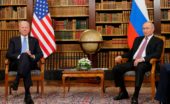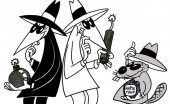Re Ian Bremmer 'Could third-party candidates upend the 2024 US election?' 3 April The current political movement in the USA…
Russia & Medvedev
Written by Diana Thebaud Nicholson // March 4, 2008 // Russia // Comments Off on Russia & Medvedev
4 March
(Stratfor) Geopolitical Diary: Medvedev’s Grand Entrance
Dmitri Medvedev started out with a bang on his first day on the job as Russian president-elect, with European leaders waking up on Monday to the news that Russia had cut natural gas supplies to Ukraine by 25 percent.
Of course, state-controlled gas monopoly Gazprom — which Medvedev chairs — said the move had absolutely nothing to do with Europe, and that it was just part and parcel of the insufferable energy issues Gazprom has with Ukraine. But that explanation is unlikely to assuage the Europeans; they heard the same story from Moscow when a Russian natural gas cutoff turned out their lights in January 2006.
In Moscow’s eyes, European recognition of Kosovar independence despite vehement Russian objections represented both a threat to Russia’s regional prowess and an opportunity to reassert Moscow’s authority in the Russian periphery. From the Russian point of view, Europe had to be taught a hard lesson that would be felt where Russia holds the most leverage — namely, in the Balkans, the Caucasus, Ukraine and the Baltic states.
We already are seeing the Russian strategy take effect. Immediately following Kosovo’s declaration of independence, we saw flames in the Balkans as Serbs in Kosovo and Bosnia began indicating they might follow the Kosovar precedent and secede to join a Greater Serbia. To the east, the Russian-sponsored Georgian separatist region of Abkhazia began mobilizing troops late last week, spelling trouble for the powder keg that is the Caucasus. On Monday, we saw the Ukrainians get a kick in the pants with Gazprom’s natural gas cutoff. And the Balkans, aware of what is likely heading their way, are simply trying to stay under the Russian radar. All these moves gradually are giving Medvedev the prestige he needs in his symbolic takeover of the Russian presidency.
The country to watch now is Germany. When the Russians turn the screws on Ukraine, the Germans feel the pain. In addition to having 30 percent of its natural gas supplies from Russia transit Ukraine, Germany must fulfill its role as the regional heavyweight capable of standing up to an aggressive Russia hovering to the east. But before Germany can deal with the Russians, it needs to get the European house in order — and that means dealing with the other European heavyweight, France.
France and Germany’s clashing views on Europe are coming to a head for the first time in decades. With France making preparations to take the EU presidency in four months, contentious issues ranging from French debt to immigration to a major French push for a Mediterranean Union now are rearing their heads, threatening the Franco-German harmony that binds the European Union. Fortunately for Moscow, this historic Paris-Berlin fault line has re-emerged just in time for the Russians to exploit.
With the Russians getting ready to rumble, the Germans don’t have time to quarrel with the French. The German priority now is to rally a united European front before it heads into negotiations with Russia, and this is exactly what German Chancellor Angela Merkel had on her mind when she sat down for a hastily arranged dinner with French President Nicolas Sarkozy on Monday night. For now, it appears as if the Germans and the French have made up. Sarkozy and Merkel came out of their meeting with an ambiguous message that they had compromised on the Mediterranean Union project, probably shelving their issues for another day.
Right now, Merkel has bigger fish to fry in Moscow, where she will be traveling this weekend to meet with Medvedev (and though officially not on the agenda, with the real power player, Putin). The message she would like to deliver in Moscow is that Europe is rallying behind her to counter Russia’s payback plan over Kosovo. But the Russians aren’t easily fooled. There is more time for this game to play out, and the Russians appear to be pacing themselves carefully.
(BBC) Ukraine may cut Europe gas supply
Ukraine has said it may restrict Russian gas supplies to Europe if gas monopoly Gazprom goes ahead with further cuts in Ukrainian supply.
(The Independent) Svetlana Medvedeva – a gregarious blonde with a broad smile and a penchant for wearing clothes from the hottest Russian designers. A socialite who is often spotted at swanky parties and fashion show, Mrs Medvedeva is also a devout Orthodox Christian, heading a special commission set up by Russia’s Patriarch that aims to inculcate spiritual values among Russia’s youth.
(Russia Today) Medvedev sweeps to victory
Russia’s youngest leader for more than 100 years will rule from May 7, after Dmitry Medvedev’s stunning victory in the presidential election. The 42-year-old gained 70.2% of the vote, handing him a mandate to continue the stability of the Putin years while diversifying Russia’s economy. Medvedev also signalled he would work in tandem with Vladimir Putin, who will become Prime Minister.



